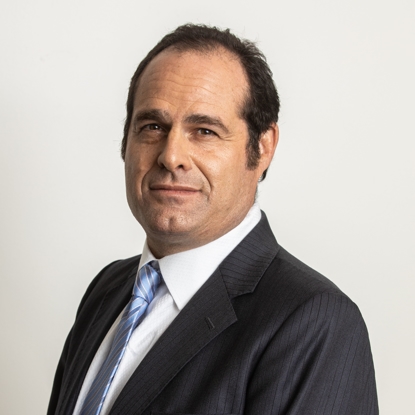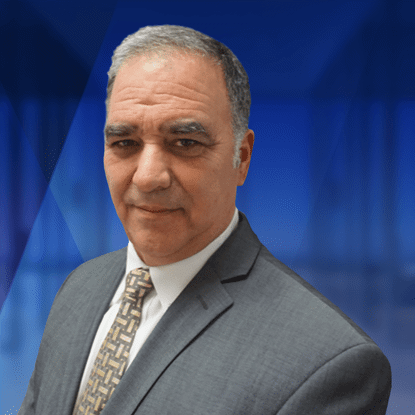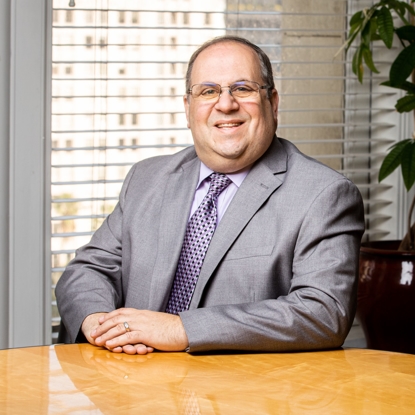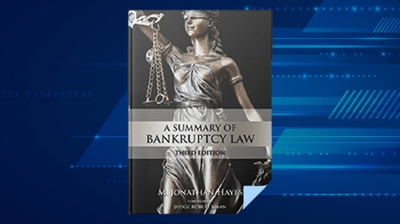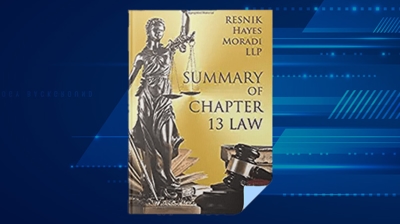
Understanding the California Bankruptcy Process
Assistance from Skilled California Bankruptcy Attorneys
If you are struggling with debt and considering bankruptcy, you may have concerns about the bankruptcy process. Some people avoid bankruptcy altogether because they think it is just too complex. While bankruptcy is a complex area of law, an experienced attorney can make the process as straightforward and simple as possible for you.
At RHM LAW LLP, our attorneys know the bankruptcy process from A to Z and have helped numerous clients achieve debt relief by filing for Chapter 7 and Chapter 13 bankruptcy. Our bankruptcy lawyers in Los Angeles will work with you personally to help you explore your debt relief options. If you decide bankruptcy is right for you, we will guide you through the process and handle all of the legal details. We represent clients in San Fernando Valley and throughout Los Angeles, Riverside, San Bernardino, and Orange Counties.
For a 30-minute complimentary consultation, contact our firm today. It could be your first step on the road to debt relief.
Chapter 7 Bankruptcy Process in California
In a Chapter 7 bankruptcy, a trustee “steps into the shoes of the debtor” for a short period of time. Assets that cannot be protected can be liquidated and The Trustee will make distributions to creditors. Keep in mind, the majority of Chapter 7 bankruptcies are “no asset” cases, meaning the debtor’s assets are entirely exempt from being seized and liquidated. It is extremely important to obtain the proper bankruptcy counsel to preserve and protect what is important to you and your family!
Following is a general outline of what you can expect from the Chapter 7 bankruptcy process:
- We will review your financial situation, including looking at your last two months of pay stubs, credit reports, lawsuits against you, and other details
- If you decide bankruptcy is right for you, you will have to undergo a means test to determine if you qualify for Chapter 7
- If you qualify, we can file the bankruptcy petition, enacting the automatic stay, and stopping your creditors from taking further actions against you
- You must attend a meeting with your trustee, which takes place 30 to 45 days after filing
- When your bankruptcy is successful, your debt is discharged after four to six months from the date of filing
Chapter 13 Bankruptcy Process in California
If you file for Chapter 13 bankruptcy, you face a different process. Debt is not discharged immediately, but rather after the completion of a three- to five-year payment plan. All collection efforts are stopped! You will propose a feasible payment plan to the bankruptcy court, based on a number of factors, including the amount and nature of your debt, your assets, and your “disposable” income. You can even cure the arrears on your home and force the lender to cure the payments over 60 months! This can be accomplished for other secure debt as well including but not limited to your car, tools of the trade, and even IRS debt!
Filing for Chapter 13 immediately enacts the automatic stay, which protects you from home foreclosure, repossession, creditor harassment, and other consequences of debt. Whether you file for Chapter 7 or Chapter 13 bankruptcy, our Los Angeles bankruptcy lawyers will guide you through every step of the process.
Here is a FAQ section to address common questions about the bankruptcy process in California:

RHM LAW LLP
Meet Our Los Angeles Bankruptcy Specialists
-
 M. Jonathan Hayes Senior Counsel
M. Jonathan Hayes Senior Counsel -
 Matt D. Resnik | Partner Partner
Matt D. Resnik | Partner Partner -
 Roksana D. Moradi-Brovia | Partner Partner
Roksana D. Moradi-Brovia | Partner Partner -
 Russell J. Stong III | Associate Attorney Senior Associate Attorney, Los Angeles Office
Russell J. Stong III | Associate Attorney Senior Associate Attorney, Los Angeles Office -
 W. Sloan Youkstetter | Associate Attorney Senior Associate Attorney, Los Angeles Office
W. Sloan Youkstetter | Associate Attorney Senior Associate Attorney, Los Angeles Office -
 David M. Kritzer Senior Associate Attorney, Encino Office
David M. Kritzer Senior Associate Attorney, Encino Office

Client Reviews
What Clients Say About Working With Us
-
"I filed bankruptcy with this firm 3 years ago and found that they are professional, friendly, and compassionate."I filed bankruptcy with this firm 3 years ago and found that they are professional, friendly, and compassionate. I also met with their loan modification department. Unfortunately, they were unable to help because of the type of loan that I have. I really appreciated that they did not lie, waste my time, or take my money in an attempt to modify a loan that was not doable. I've since used their firm for a couple of minor issues and found all of the attorneys to be knowledgeable and considerate. Attorneys Simon and Resnik are amazing!- Shannon J.
-
"I cannot thank them enough for helping save my home. I would recommend them for anyone that is thinking about filing for bankruptcy or foreclosure on their home."I needed a bankruptcy attorney in Sherman Oaks and found Matt Resnik on Google. He has one of the best-reviewed bankruptcy law firms on Yelp so I decided to check it out his law firm for myself. I quickly found out that they are foreclosure specialists and they could help me with my issue. They made the process very easy for me and laid out my options for me. I cannot thank them enough for helping save my home. I would recommend them for anyone that is thinking about filing for bankruptcy or foreclosure on their home. They are the best bankruptcy law firm in Sherman Oaks.- Joseph R.
-
"He made me feel like I had options, all was not lost, and I could rebuild my credit."Matt is the best bankruptcy attorney in Sherman Oaks. I consulted with Matt over a chapter 7 bankruptcy. I had issues with overwhelming credit card debt after Chase increased it's APR for no reason. It set off a chain of events that were really hurting me. He made me feel like I had options, all was not lost, and I could rebuild my credit after the 7. I had some concerns about a piece of property I was having issues with and Matt also turned out to be a real estate lawyer as well! I recommend this office to anyone who is unsure of their financial situation. It doesn't hurt to find out your options.- Max B.
-
"As the dank blanket of economic uncertainty continues to depress the hopes of many of us, I keep your business cards and number available for others."This is to thank you for the exceptional work of you and your fine staff. In managing my bankruptcy and loan modification, a nearly five-year effort, your performance was stellar. I never felt alone or adrift, key concerns in those circumstances. The outcome was outstanding. As the dank blanket of economic uncertainty continues to depress the hopes of many of us, I keep your business cards and number available for others. Without hyperbole, I can attest that you are present a beacon. Thank you so much.- K.C.
-
"Matt and his staff conducted themselves with professionalism throughout the whole ordeal."I worked with Matt and his team for about a year to get through the paperwork shuffle and my personal experience was nothing short of fantastic. Legal situations have a tendency to get hairy, but Matt and his staff conducted themselves with professionalism throughout the whole ordeal. To keep it short, let's just say he under-promised and over-delivered. Rarely would I ever say this about an attorney, but overall he was just a great guy. I would not hesitate to have him on my side of the courtroom again. World market is right across the street from his office and I even decided to get his staff a thank you / holiday gift card. World market has excellent craft beer BTW, try the Einstock White Ale. They also validate parking. That just shows this isn't a fake review.- Dean C.
-
"Was very impressed with the comprehensive professionalism of the firm..."
Was very impressed with the comprehensive professionalism of the firm, especially Matthew Resnik... I had suffered through the incompetence of two previous bk lawyers not to mention fees far greater than anticipated, without resolution. Having never gone through bk before, I did not realize how difficult it could be...then, my case was turned over to Mr. Resnik...almost immediately there was a marked positive difference. Where there was little to no communication, all of a sudden I am getting updates...regularly. Further, my case was finally discharged...yet, Mr. Resnik continues to communicate, offer assistance...and, has NEVER asked for additional fees, which I am sure he could have justified...much unlike the two previous attorneys with which I was dealing. I have no reservations, whatsoever, referring and recommending Matthew Resnik for any and all business or personal bk issues...or, other wise. I have no doubt that he will be transparent on helping you regardless of the problem. Good guy.. good firm... a wonderful experience!
- G.L -
"We are very happy that you were able to accomplish the modification of our loan in such a short period of time. Thank you again for your professional service."
Dear Mr. Resnik: We wanted to thank you for your professional handling of our loan modification with GMAC mortgage. We are very happy that you were able to accomplish the modification of our loan in such a short period of time. Thank you again for your professional service.
- W and B Mejia -
"He negotiated on my behalf with a credit card company and was able to settle with them for much lower than I could have on my own."I worked with David Kritzer at this firm, and he was great. He negotiated on my behalf with a credit card company and was able to settle with them for much lower than I could have on my own thanks to his knowledge and expertise in the field. If you have a debtor on your back go to him to get it taken care of.- Kelly S.
-
"They were thorough, extremely knowledgeable, wonderful to deal with, thoughtful, and really helped guide me through what was one of the toughest times in my life."Matt and his team are the best!! They were thorough, extremely knowledgeable, wonderful to deal with, thoughtful, and really helped guide me through what was one of the toughest times in my life. I never felt judged or looked down on. They were efficient and really were lifesavers during this tough time. I can not recommend them highly enough!!!!- Rusty H.

-
 A Summary of Bankruptcy Law: Third Edition
A Summary of Bankruptcy Law: Third Edition -
 Summary of Chapter 13
Summary of Chapter 13

